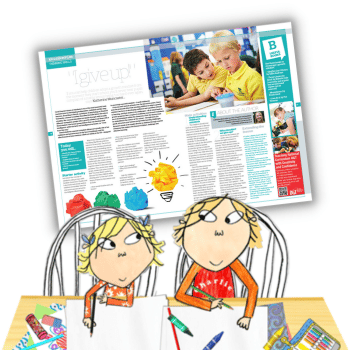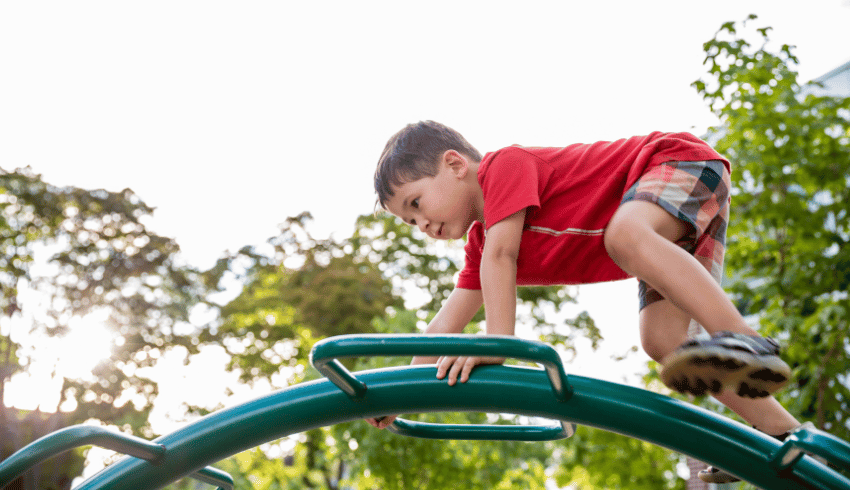Fixed mindset? – Theory, controversy and real classroom examples

We explore the concept of fixed mindset vs growth mindset, the controversies surrounding the theory and hear from teachers who have put it into practice…

- by Teachwire

What is a fixed mindset?
According to speaker and author Eduardo Briceño, a fixed mindset is “the belief that abilities cannot change and that people are limited to being skilled at certain things, like maths or sports, for example.”
Harley Richardson, director of design and development at Discovery Education, adds that “People with a fixed mindset see their mental abilities as limited, and so are more likely to become disheartened and give up when they fail at a task.”
“People with a fixed mindset see their mental abilities as limited”
On the other hand, a growth mindset – a phrase coined by Stanford University professor Dr Carol Dweck – is the belief that “we can develop our abilities, including our intelligence, and therefore develop the way we think,” explains Briceño.
JUMP TO A SECTION
- Dweck’s research
- Is fixed mindset vs growth mindset actually useful in education?
- How to turn a fixed mindset into a growth mindset
- Case study: How one primary school approached fixed and growth mindset
“We are inherently focused on praising school students when they have done something well or quickly (eg ‘you’re so smart’) to help build confidence”, continues Briceño. “But although it feels like we’re being encouraging, this type of praise encourages a fixed mindset.”
“By concentrating on building a growth mindset and understanding that talents or skills are not fixed, children will be willing to take on more challenges and be more successful.
“They will seek out to learn and do the hard things that they don’t know how to do.”
Briceño explains that we often mistake a growth mindset for having a positive outlook or being open-minded. However, in reality, it’s something that can lead to more positive behaviours.
“We often mistake growth mindset for having a positive outlook”
“It is important to understand that having a growth mindset does not act as a silver bullet for achieving these behaviours. Nothing is automatically achieved, but the potential to do so is there”, Briceño says.
Fixed mindset in the classroom

Assistant headteacher Jenni Willis sees two broad categories of fixed mindset learners in the classroom that avoid challenges. The first category of children have had “an overwhelming amount of well-meant one-to-one adult support from home, school or both”, she explains.
“They lack the independence to apply their skills or the confidence to just have a go without a hand to hold.”
This might reveal itself in a Reception PE class, for example. “Children who have no experience of playgrounds or walking along walls are frightened to risk walking along or jumping off the bench solo,” Willis explains.
Children with one-to-one support as part of their EHC plan can also fall into this group. This is “unless independence and perseverance are championed by their special needs assistant”, explains Willis.
The second category of children is what Willis describes as “non-risk takers”. These are “usually quiet rule followers.” She describes them as “children that like to get whatever it is that they are doing perfectly right.”
Willis explains that in her school, these are often ‘top middle attainers’, and more than likely to be girls.
Dweck’s research
The growth mindset vs fixed mindset theory was proposed by Carol Dweck over 30 years ago. But it’s over the last few years that it has attracted a lot of attention in the UK.
Dweck’s fixed vs growth mindset theory is more complex than simply ‘try, and you will succeed’. She is actually making three claims, as English teacher David Didau explains:
- Having a growth mindset leads to better academic achievement
- Having a fixed mindset leads to worse student achievement
- Providing students with a growth mindset intervention changes students’ mindset and thereby improves their academic performance
As Harley Richardson explains, Dweck’s theory “taps into the current enthusiasm for all things cognitive science.”
Dr Dweck’s research in schools found exceptionally strong support for her theory. But others have struggled to replicate the results, or have even claimed that having a growth mindset can have a detrimental effect on academic results.
Is fixed mindset vs growth mindset actually useful in education?
As teacher Didau explains, the three claims listed above “are all testable theories and Dweck and her colleagues have amassed a host of impressive data to support them.”
However, he goes on to explain that there is also good research supporting the idea that “inborn ability (including but not limited to intelligence) matters, a lot.”
In addition to this, Didau points out that when schools try a growth mindset intervention without support from Dweck or her colleagues, “sometimes it doesn’t work.”
For instance, Didau points to the Education Endowment Foundation trial, Changing Mindsets, which was unable to replicate Dweck’s results. “It concluded that any improvements observed may have been down to chance,” explains Didau.
Harley Richardson sees fixed mindset vs growth mindset as “an idea to engage with, rather than a scientific claim to accept unquestioningly or reject outright.”
False growth mindset
If you’ve attempted to teach growth mindset strategies to pupils but feel it hasn’t particularly worked, Didau explains that the problem might be “that either you or your students have a ‘false growth mindset’.”
He goes on to explain that this is “where people say they have a growth mindset but really they secretly persist in having a fixed one.”
“Because we’ve unanimously agreed that having a fixed mindset is egregious and a growth mindset makes you a better all-round human being, no one wants to fess up to being ‘fixed’.”
“No one wants to fess up to being ‘fixed'”
“When asked, we tend to say, “Yes of course I have a growth mindset,” because the alternative is to say, “No, I’m afraid I’m a terrible person.””
Problem with the theory?
Didau explains that Carol Dweck came up with an addition to her theory to explain why her suggested interventions don’t always work: if students don’t make an improvement then they haven’t really developed a growth mindset.
“The problem with a theory that explains away all the objections is that there are no conditions in which the claim could not be true,” says Didau. “By invoking the ‘false growth mindset’, Dweck has made her claims untestable.”
And while Didau isn’t claiming that a growth mindset is completely wrong or useless, he warns against teachers deeming any student who fails as “just not trying hard enough”, calling this message “both harmful and wrong.”
Kevin Rooney, from the IOI Education Forum, suggests that a growth mindset is “rapidly becoming another accountability stick to beat teachers with”. He talks of teachers being “berated by senior leadership when their students’ grades don’t hit the desired targets.”
How to turn a fixed mindset into a growth mindset
Five mistakes your school might be making
If schools are interested in cultivating a growth mindset, former teachers and co-founders of Grow Your Mindset, Elizabeth Cronshaw and Gemma Sanchez, warn against merely “scratching the surface of the concept or even, in some cases, magnifying a ‘fixed mindset’ approach to learning without even realising.”
“Growth mindset isn’t a quick fix or a tick box exercise, concluding with a few staff sessions, PSHE lessons and some inspirational posters,” explain Cronshaw and Sanchez. “A true growth mindset is much more than this.”

Here they lay out five common mistakes that schools make when trying to turn a fixed mindset into a growth mindset.
1 | Starting with the kids
Many schools jump head-first into introducing growth mindset to the children. Instead, it’s vital to first ask staff to reflect on and develop their own mindset.
This will have a greater impact on children in the long run. This doesn’t involve simply handing each member of staff a copy of Carol Dweck’s book, either.
“Growth mindset isn’t a quick fix or a tick box exercise”
To learn and grow, you must set aside regular time with staff to support them in developing and reflecting on their own mindsets via high-quality CPD.
When staff have a deep understanding of the positive and negative roles of mindsets, they can better support each other and their pupils to shift their thinking.
As new staff members join, they will need quality time with a coach to help them get up to speed with the concept.
2 | Using meaningless phrases
The words we speak impact massively on the mindsets of both our pupils and our colleagues. In the same way that positivity can breed positivity, negativity can also feed negativity.
Telling your class that they can’t do it ‘yet’ doesn’t mean that they will necessarily be able, without a particular focus, to do it tomorrow.
They may need a change of strategy or more time practising the skill. Children need to be made aware of this. Also, telling pupils and staff that changing their words will change their mindset has its faults.
Some argue that this is in fact back to front. It is only when you change your mindset that your words and actions naturally follow. It’s all about action and dedication. Words have little meaning unless you act upon them.
3 | Praising outcomes, not progress
Far too often, we praise children for getting things ‘correct’ or being speedy learners. This doesn’t mean a child has a growth mindset.
“Far too often, we praise children for getting things ‘correct’ or being speedy learners”
In fact, it could mean they are not being challenged enough. Or that they’re rushing for fixed mindset reasons, such as wanting to ‘look smart’.
4 | Either/or approach
There seems to be a misunderstanding that as individuals we are either fixed mindset or growth mindset. We are, in fact, all a mixture of both.
We’re all born with a growth mindset. But our life experiences and the environment in which we grow up cause us to develop fixed mindset triggers.
“We’re all born with a growth mindset”
Our reaction to and attitude towards challenges, mistakes and feedback determine the progress we make. As we become more familiar with what causes these triggers, we can begin to embrace them. We can put into place practices and structures that allow us to retrain our brains to become more growth-orientated.
This journey requires us to be open and honest about what our fixed mindset triggers are. This is in order to develop a consistent approach in school.
5 | Not involving your community
This includes parents, governors, office staff and lunchtime supervisors. Give every single person who works with the children in your school the opportunity to learn about and develop your growth mindset culture.
In fact, they are of huge importance to its success. It’s all about consistency and the children receiving the same message throughout the day, both at school and at home.
Making learning worthy
Speaker and author Eduardo Briceño explains that in the classroom, it’s important that teachers “portray abilities as skills that people develop, not as talents that students either inherently do or don’t have.”
He continues, “For example, although it may feel positive, we should try and avoid labelling children as ‘smart’ or ‘talented’. Instead, we should focus on talking about and reflecting on their behaviours, their choices, and what they can control.”
“We should try and avoid labelling children as ‘smart’ or ‘talented’”
As teachers we need to model this for pupils, by sharing what and how we learn, what mistakes we make and how we grow in response. This will enable children to see examples of lifelong learners and they’ll hopefully follow in our footsteps.
Briceño believes that children should “find what they are learning to be interesting, valuable and relevant.” He suggests that a great activity to help encourage a growth mindset is to share why you, the teacher, love learning. Talk about:
- what you’re seeking to learn these days
- how you’re going about it
- what ‘aha!’ realisations you have had
“Then ask students to each share something they’ve enjoyed learning about recently and what they found interesting about it,” suggests Briceño.
“If students find what we’re teaching them boring, we are teaching them that learning is a drag, which kills self-directed attempts. Instead, we should be developing the idea that learning is a lifelong journey, and help them to identify where their individual passions lie.”
Case study: How one primary school approached fixed and growth mindset

Jenni Willis, an assistant headteacher in Bolton, explains how her school went about encouraging children to develop a ‘have a go’ attitude…
In 2014, I moved from Y6 to Reception. It alarmed me that I could probably predict the children in my new class that would find the reasoning and problem-solving strands of the Y6 curriculum difficult seven years later.
Moreover, it was possible that no amount of traditional basic skills intervention would make it more natural or easier for them. Could we do something? Is it possible to develop a ‘have a go’ attitude or teach resilience, or should we accept their fate?
Modelling a growth mindset, we were determined to try.
Learning to fall
With our youngest children, we used the ‘characteristics of effective learning’ as the lead objective of our learning. We focused primarily on:
- having a go
- taking a risk
- Developing perseverance and resilience
We tracked students using Leuven’s scale of active engagement. Working with parents, we enabled our pupils to have their first real experience of learning to ride (and fall off) two-wheel bikes. Throughout this experiment we talked to them explicitly about getting back on the bicycle and how, with good practice, they were getting better.
- Rosie Revere, Engineer, by Andrea Beaty
- The Dot by Peter H Reynolds
- The Most Magnificent Thing by Ashley Spires
- Giraffes Can’t Dance by Giles Andreae
- Three Cheers for Errol by Babette Cole
- Moondance by Frank Asch
- I Can Do It by Pat Thomas
Planning for learning
We planned different activities to give target children the opportunity to be leaders, coaches and teachers. Learning to take risks became a featured part of our curriculum.
The bike riding was an overwhelming success. We openly talked about the experience of deliberate practice and failing at first. We then applied this to other skills and curriculum areas.
Further up the school, every class adopted a growth mindset motto, such as “It’s the ‘umph’ that turns ‘try’ into ‘tri-umph’!”).
We talked to the children about role models and how their brains work (including the fab animations from ClassDojo). We prioritised celebrating perseverance and determination with ‘star of the week’.
In truth, it was the focus on planning for learning and how we could give progress an intrinsic merit that had more impact in classes than any slogan or song.
We purposefully modelled making (fake) mistakes. Teachers talked through their thought processes more than ever before, and in all curriculum areas.
“We purposefully modelled making (fake) mistakes”
We provided far more opportunities to edit, redraft and work on problems for longer. Teachers ensured that they placed as much (if not more) emphasis on improvement and the ‘process’ than the end product.
Gentle push
We also thought long and hard about the groups of children that were particularly vulnerable. It was important to think about how we could target progress in this area for them.
We planned carefully and with high expectations to ensure our learners did not always achieve success easily. We established the expectation that no child should have everything correct in most of their work. After all, mistakes help learning.
We shuffled children’s groupings and seating arrangements. This enabled those clearly struggling with making mistakes to work in a less exposed environment or a more secure group, to encourage risk taking.
“We shuffled children’s groupings and seating arrangements”
This proved particularly successful for a few groups of children in maths. We allowed them a little group discussion and reasoning about problems with their peers before putting pen to paper.
Importantly, we also worked with parents. We showed them some of Carol Dweck’s work and talked through anecdotal evidence from their children’s classes.
We discussed the value of praising their child’s effort and letting them struggle a little. And how this is difficult as a parent!
Developing relationships
Through all of the tweaks to policy and practice, I still think the most important factor in helping a class develop resilience is your relationship with the pupils.
We need to form it on a bedrock of trust. Without that, making that leap into the uncertain is scary and appears impossible.
Children can achieve the unexpected when they have a teacher rooting for them. It’s important to:
- model determination
- champion and vocalise children’s aspirations
- carefully find a balance between scaffold and giant leap
In a culture where making mistakes is not only the norm but expected and praised, the vast majority of children will come with you. Try saying, “I’m really glad you made that mistake – can we show the class, so we all learn from it?”.
It’s hard work to swim against the tide. Some children are ready for a gentle push, others may need more reassurance about the landing. But it’s knowing your children – really noticing them and listening to them – that is the difference between a fall and truly flying.










